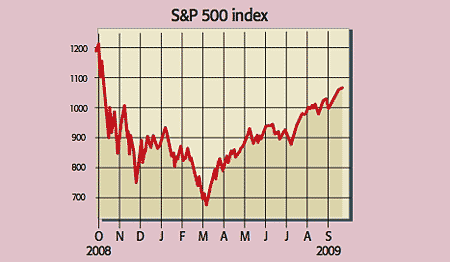Get the latest financial news, insights and expert analysis from our award-winning MoneyWeek team, to help you understand what really matters when it comes to your finances.
You are now subscribed
Your newsletter sign-up was successful
Want to add more newsletters?

Twice daily
MoneyWeek
Get the latest financial news, insights and expert analysis from our award-winning MoneyWeek team, to help you understand what really matters when it comes to your finances.

Four times a week
Look After My Bills
Sign up to our free money-saving newsletter, filled with the latest news and expert advice to help you find the best tips and deals for managing your bills. Start saving today!
"It seems that for every investor suffering a moment of doubt... there are another two willing to buy into the smallest sign" of stockmarket weakness, said David Jones of IG Index.
The FTSE All-World index is up 68% from its March low. America's S&P 500 index has jumped by 60% since then, an unprecedented increase in six months; like the FTSE 100 and European markets, it is at an 11-month high. Corporate credit indices have also hit a high for the year.
What the commentators said
Amid signs of economic recovery and with turmoil in markets having abated, the return of risk appetite "is logical up to a point", said Richard Beales on Breakingviews. But "there are clear signs of an overshoot on the upside an echo bubble".
MoneyWeek
Subscribe to MoneyWeek today and get your first six magazine issues absolutely FREE

Sign up to Money Morning
Don't miss the latest investment and personal finances news, market analysis, plus money-saving tips with our free twice-daily newsletter
Don't miss the latest investment and personal finances news, market analysis, plus money-saving tips with our free twice-daily newsletter
Note, for instance, that the S&P 500 has risen to its highest level above its 200-day moving average, a closely monitored indicator of long-term sentiment, since the early 1980s, said Michael Mackenzie in the FT. That didn't even happen during the great bull run of the 1990s. Hopes are also "riding high" in Britain, as Investorschronicle.co.uk pointed out. Cyclical plays have raced ahead and FTSE 350 earnings are expected to bounce by 20% next year and 22% next year.
Typically, by the time the S&P is up 60%, said David Rosenberg of Gluskin Sheff, the US economy is well into its third year of recovery and has created one million new jobs. Yet since March there have been as many job losses as during the whole of the last recession and we're still trying to pinpoint when exactly the US recession ended. The end of a recession is one thing, but the sharp, "solid" recovery everyone is counting on looks highly unlikely.

Growth has been propped up by unsustainable government spending and with consumers deleveraging on both sides of the Atlantic and credit tight, the recovery is set to be "fragile, slow and protracted", as the Confederation of British Industry said this week. The latest IMF study of the aftermath of banking crises shows that output per head is still, on average, 10% lower seven years on, said Economist.com. The effects of the downturn will be felt "long after it is technically over".
It's not just inflated recovery hopes that are powering the rally; it's also a flood of cheap money. Central banks' cash injections and historically low interest rates have not eased the credit squeeze, but have seeped into asset markets and now that "animal spirits have revived" we appear to be well on the way towards a new bubble, said Beales. Just don't confuse a liquidity-driven rally with a sustainable bull market, said Rosenberg. Only "positive fundamentals" produce those.
Get the latest financial news, insights and expert analysis from our award-winning MoneyWeek team, to help you understand what really matters when it comes to your finances.
MoneyWeek is written by a team of experienced and award-winning journalists, plus expert columnists. As well as daily digital news and features, MoneyWeek also publishes a weekly magazine, covering investing and personal finance. From share tips, pensions, gold to practical investment tips - we provide a round-up to help you make money and keep it.
-
 Average UK house price reaches £300,000 for first time, Halifax says
Average UK house price reaches £300,000 for first time, Halifax saysWhile the average house price has topped £300k, regional disparities still remain, Halifax finds.
-
 Barings Emerging Europe trust bounces back from Russia woes
Barings Emerging Europe trust bounces back from Russia woesBarings Emerging Europe trust has added the Middle East and Africa to its mandate, delivering a strong recovery, says Max King

